
Engineering Review
Scope & Guideline
Showcasing cutting-edge studies in engineering.
Introduction
Aims and Scopes
- Sustainable Engineering Practices:
Research that integrates sustainability into engineering processes, including waste valorization, renewable energy production, and lifecycle assessments. - Advanced Materials and Nanotechnology:
Exploration of novel materials, particularly nanomaterials and their applications in various fields such as medicine, energy, and environmental remediation. - Chemical Engineering Innovations:
Studies involving chemical processes, catalysis, and bioprocessing aimed at enhancing production efficiency and environmental sustainability. - Biotechnology and Bioengineering:
Focus on the application of biological systems and organisms in engineering processes, particularly in waste treatment, bioremediation, and biofuel production. - Process Optimization and Computational Methods:
Utilization of computational techniques and modeling to optimize engineering processes, including fluid dynamics, reaction kinetics, and system efficiencies.
Trending and Emerging
- Biomass Valorization and Renewable Energy:
An increasing focus on converting biomass into energy and valuable products, emphasizing sustainable practices and reducing waste. - Nanotechnology Applications in Engineering:
A surge in research related to nanomaterials and their applications in various sectors, including medicine, energy, and environmental protection. - Integration of AI and Machine Learning:
Growing interest in applying artificial intelligence and machine learning techniques to optimize engineering processes and enhance system efficiencies. - Advanced Wastewater Treatment Technologies:
Emerging trends in innovative wastewater treatment methods, including electrochemical processes and bioremediation, highlight the push for sustainable water management. - Circular Economy and Resource Recovery:
A notable trend toward research focused on circular economy principles, emphasizing resource recovery and recycling in various engineering domains.
Declining or Waning
- Traditional Waste Treatment Techniques:
There is a noticeable decline in research focused on conventional methods of waste treatment, as attention shifts towards more innovative and sustainable solutions. - Static Material Properties:
Research centered around static properties of materials is becoming less prominent, with a greater emphasis on dynamic behavior and applications of advanced materials. - Basic Chemical Engineering Principles:
Fundamental studies in chemical engineering principles appear to be waning, potentially overshadowed by more application-oriented and interdisciplinary approaches. - Non-Sustainable Energy Sources:
With the global shift towards sustainability, research focusing on fossil fuel-based energy sources is declining, as interest grows in renewable energy technologies. - Conventional Catalysis:
Research on traditional catalytic processes is decreasing, as there is a growing preference for innovative catalytic materials and methods that align with sustainability goals.
Similar Journals
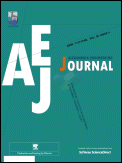
Alexandria Engineering Journal
Connecting scholars and practitioners in engineering excellence.Alexandria Engineering Journal is a premier open access publication dedicated to advancing the field of engineering. Published by ELSEVIER and headquartered in Amsterdam, the Netherlands, this journal has been at the forefront of disseminating innovative research since its inception in the year 2000. With its impressive Q1 ranking within the Engineering (miscellaneous) category and a notable position as #20 out of 307 in the Scopus rankings, it serves as a vital resource for scholars and practitioners alike, ensuring that cutting-edge findings reach a global audience. The journal is accessible to all since adopting open access policies in 2010, thereby facilitating the sharing of valuable insights without barriers. As we approach the convergence of years from 2000 to 2024, the Alexandria Engineering Journal continues to play a pivotal role in shaping engineering practices and underpinning significant advancements in the field.
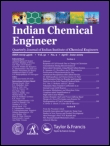
Indian Chemical Engineer
Elevating Standards in Chemical Engineering Research.Indian Chemical Engineer, published by Taylor & Francis Ltd, stands as a reputable journal in the field of chemical engineering, encompassing a wide range of topics pertinent to both academia and industry. With an ISSN of 0019-4506 and an E-ISSN of 0975-007X, this journal has been a key resource for researchers and professionals since its inception in 1992, undergoing a significant evolution from 2009 to 2024. Currently ranked in the Q3 category of chemical engineering (miscellaneous) in 2023, it reflects a dedicated commitment to disseminating innovative research and insights within the discipline. The journal is indexed in Scopus, achieving a rank of 148 out of 273, which denotes its growing influence in the field with a 45th percentile placement. Although currently not an open-access publication, it offers valuable content that contributes extensively to the advancement of chemical engineering research and education. Researchers, professionals, and students alike are encouraged to engage with this publication to stay at the forefront of industry advancements and academic discussions.

KAGAKU KOGAKU RONBUNSHU
Fostering Academic Dialogue in Chemical InnovationKAGAKU KOGAKU RONBUNSHU is a distinguished journal published by the SOC CHEMICAL ENG JAPAN, focusing on the interdisciplinary realms of chemical engineering and chemistry since its inception in 1975. With a commitment to advancing knowledge in these fields, the journal has established itself as a critical forum for researchers, professionals, and students alike, contributing to the understanding and application of chemical processes and materials sciences. Although it operates under a traditional publication model, the journal garners attention within the academic community, reflected in its Q3 rankings in both Chemical Engineering and Chemistry categories as of 2023. With the journal's ISSN 0386-216X and a comprehensive coverage spanning nearly five decades, it remains an essential resource for contemporary chemical research and developments, addressing ongoing challenges and innovative solutions in various applications. The journal invites submissions that reflect the latest advancements and insights in these fields, striving to foster a vibrant academic dialogue and support future innovations.

Journal of Industrial and Engineering Chemistry
Elevating Knowledge in Chemical Engineering PracticesThe Journal of Industrial and Engineering Chemistry, published by Elsevier Science Inc, stands as a premier platform since its inception in 1996, dedicated to the dissemination of innovative research in the field of Chemical Engineering. Located in South Korea, this influential journal has established itself with an impressive impact factor and is categorized in the Q1 quartile for chemical engineering (miscellaneous), ranking in the top 12% of its category according to Scopus. With a focus on cutting-edge industrial applications, the journal covers a diverse range of topics including chemical processes, engineering innovations, and sustainable practices, appealing to a broad spectrum of researchers, professionals, and students. Although currently not open access, the journal offers a wealth of resources for advancing knowledge and driving forward the chemical engineering discipline. The converged years from 1996 to 2024 reflect its ongoing commitment to excellence and timeliness in publishing high-quality research.
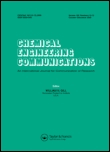
CHEMICAL ENGINEERING COMMUNICATIONS
Fostering Collaboration in Chemical Engineering Excellence.Chemical Engineering Communications, published by Taylor & Francis Inc, is a distinguished journal within the realms of Chemical Engineering and Chemistry. With an ISSN of 0098-6445, this journal plays a pivotal role in disseminating innovative research, critical reviews, and insightful discussions that encompass a broad spectrum of topics in these fields. The journal boasts a commendable Q2 ranking in the 2023 category of chemical engineering and general chemistry, reflecting its significant contribution to the scientific community. Operating under a rigorous peer-review process, the journal attracts high-quality submissions from global researchers. Although currently not an Open Access journal, it provides extensive archive access for users interested in exploring past advancements from its inception in 1973 through to 2024. With a commitment to advancing knowledge and fostering collaboration among academia and industry, Chemical Engineering Communications remains an essential resource for professionals and students aiming to stay abreast of the latest developments in chemical sciences.
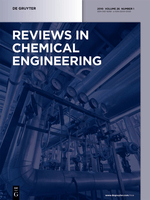
REVIEWS IN CHEMICAL ENGINEERING
Elevating Research Standards in Chemical Engineering.REVIEWS IN CHEMICAL ENGINEERING, published by Walter de Gruyter GmbH, is a premier journal that delivers cutting-edge insights and comprehensive reviews in the field of chemical engineering. Established as an eminent resource since 1982, this journal is committed to advancing knowledge and fostering innovation in various domains of chemical engineering, including process design, materials, and environmental considerations. With an impressive Q1 ranking in the 2023 Scopus category for Chemical Engineering and a commendable 20th position out of 273 journals, it is recognized for its rigorous peer-review process and high-impact contributions. Although it operates under a subscription model, the journal remains a vital platform for researchers and professionals aiming to stay at the forefront of technological advancements and scholarly discourse in chemical engineering. With a focus on interdisciplinary applications and real-world relevance, REVIEWS IN CHEMICAL ENGINEERING is an indispensable resource for academics, industry professionals, and students dedicated to excellence in this field.
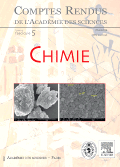
COMPTES RENDUS CHIMIE
Exploring New Frontiers in Chemistry and Engineering.COMPTES RENDUS CHIMIE, published by the prestigious Académie des Sciences in France, stands as a significant journal in the fields of chemistry and chemical engineering. With an ISSN of 1631-0748 and an E-ISSN of 1878-1543, this open-access journal has been committed to disseminating high-quality research since its transition to open access in 2020. Featuring a diverse array of studies, the journal covers innovative research trends and applications, while maintaining a Q3 category ranking in both Chemical Engineering (miscellaneous) and Chemistry (miscellaneous) as of 2023. Its Scopus rankings, positioning at #251 out of 408 in general chemistry and #169 out of 273 in general chemical engineering, highlight its growing impact within the scientific community. Authored by a global cohort of scientists and researchers, COMPTES RENDUS CHIMIE is dedicated to the advancement of knowledge and sharing insights that are vital for ongoing research and development in the chemical sciences. Located in the heart of Paris at 23 Quai de Conti, 75006, France, the journal is an essential resource for those passionate about chemistry and engineering disciplines, fostering collaboration and innovation across the world.

ACS Engineering Au
Exploring Interdisciplinary Frontiers in Engineering ResearchACS Engineering Au, published by the American Chemical Society, is an esteemed open-access journal dedicated to advancements in the field of engineering, encompassing a wide range of interdisciplinary studies that merge principles of chemistry with cutting-edge engineering practices. With an E-ISSN of 2694-2488, this journal aims to disseminate significant and innovative research findings that contribute to the development of sustainable technologies and solutions in various engineering domains. Since becoming an open-access journal in 2021, it has fostered greater accessibility and visibility for researchers and practitioners alike, encouraging collaboration and knowledge sharing across the global community. By providing a platform for high-quality research, ACS Engineering Au plays a pivotal role in shaping the future of engineering disciplines, making it an essential resource for academics, industry professionals, and students who are eager to stay at the forefront of engineering advancements.
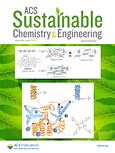
ACS Sustainable Chemistry & Engineering
Empowering researchers to shape a sustainable future.ACS Sustainable Chemistry & Engineering is a premier journal published by the American Chemical Society, dedicated to advancing knowledge and innovation in the fields of sustainable chemistry and engineering. With an impressive impact factor and a consistent ranking in the Q1 category across various disciplines such as Chemical Engineering, Chemistry, Environmental Chemistry, and Renewable Energy, this journal serves as a vital resource for researchers, professionals, and students alike. Since its inception in 2013, the journal has been committed to publishing high-quality, peer-reviewed articles that address the critical challenges of sustainability in chemistry and engineering. With no open-access option currently available, the journal emphasizes the importance of premium scholarly communication. As the field continues to evolve, ACS Sustainable Chemistry & Engineering remains at the forefront of providing cutting-edge research that impacts our understanding and application of sustainable practices in the chemical sciences.

KOREAN JOURNAL OF CHEMICAL ENGINEERING
Championing Quality Research in Chemical Engineering.The Korean Journal of Chemical Engineering is a prestigious publication by the Korean Institute of Chemical Engineers, dedicated to advancing the field of chemical engineering and its associated sciences. Established in 1984, this journal has made significant contributions to the dissemination of innovative research, covering a broad spectrum of topics within chemical engineering and general chemistry. With a current impact factor placing it in the Q2 quartile within both the chemical engineering and chemistry categories, it is recognized for its rigorous peer-review process and high-quality articles. The journal provides a valuable platform for researchers, professionals, and students to share their findings and collaborate on emerging methodologies and technologies. Although it does not offer open access options, its broad international readership, bolstered by its Scopus rankings — including a commendable #108 in general chemical engineering — ensures widespread visibility and dissemination of published works. As it approaches its 40th anniversary in 2024, the Korean Journal of Chemical Engineering continues to be an essential resource for anyone engaged in the field, driving innovation and academic dialogue worldwide.